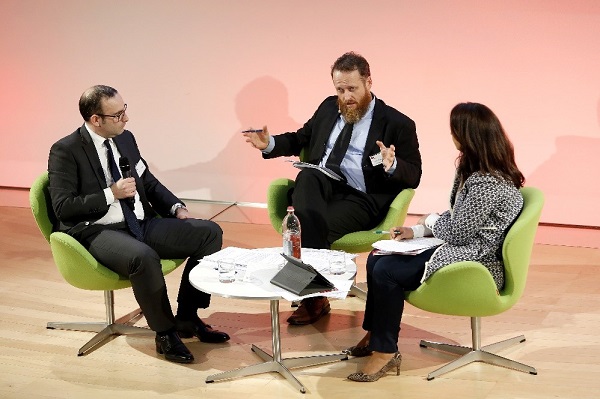
On Wednesday 14 December 2016, Mohammed Kroessin, Head of the World Islamic Microfinance Unit at the Islamic Relief Worldwide, addressed the Banque de Luxembourg at the 37th Midi de la Microfinance event, hosted by ADA and the InFiNe.lu network; also, Fadoua Boudiba, Senior Investment Officer for MENA and Africa at Triodos Bank, explained the challenges of the development of this sector across the world; the discussion was moderated by David Demulier.
Sharia-compliant financing is unique and differs significantly from conventional microfinance. The sector seeks to provide an economic empowerment tool for the poor or disadvantaged on the basis of sharia-compliant financing methods that avoid interest because of the ethical value of the Islamic economy. The prohibition by the Muslim religion has allowed it to develop another form of finance and microfinance.
Many ideas have been put in place to circumvent these prohibitions, based on a principle of partnership between investor and customer. The two eventually form a couple who win or lose together. "A sort of marriage that assumes all risks, both profits and losses," explained Fadoua Boudiba.
Various such products are constantly being developed in this sector to meet the many needs, but during the Midi event, an emphasis was placed on two products most used: Salam and Murabaha:
• The first is an agreement between the microfinance institution (MFI) and the entrepreneur, who sells a product delivered at a later date for a specific price paid in advance. In other words, it is an early term sale, used mainly in the agricultural sector.
• The second product, used 70% of the time, refers to a profit made by the MFI resulting from a sale transaction of a commodity for a given price plus a certain margin of profit agreed between the MFI and the customer. The profit margin can be either a percentage of the purchase price or a lump sum.
Mohammed Kroessin explained that "this is the putting into practice of the old principles of cooperative finance of Muslim society, retransmitted in the present society".
Fadoua Boudiba of Triodos Bank also pointed out that in many countries where Islamic finance is practiced that there is a demand for these financial services also from non-Muslims who prefer this kind of partnership with the sharing of risk that a simple debt with interest rates. In Malaysia, half of Islamic banking clients are non-Muslims!...
Despite the growing development, with new markets also opening up to this need, such as in Tajikistan and Middle East countries, the sector faces many challenges, due to a lack of regulation. Paradoxically, countries like Saudi Arabia do not yet recognise the products of Islamic finance.
But just as traditional microfinance has had a tough start in terms of attractiveness to investors, Sharia-compliant finance will also have to be patient before it can grow thanks to international investors.
In conclusion, Gilles Franck, board member of ADA, stressed the common objectives of both types of microfinance: creating social benefit and reducing poverty. Moreover, they can perfectly coexist in order to let customers around the world choose between these different practices and products.








